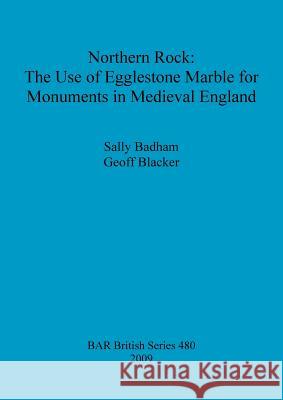Northern Rock: The Use of Egglestone Marble for Monuments in Medieval England » książka
Northern Rock: The Use of Egglestone Marble for Monuments in Medieval England
ISBN-13: 9781407304151 / Angielski / Miękka / 2009 / 147 str.
Egglestone marble, also known as Teesdale marble, is one of a group of so-called sedimentary 'marbles', such as the better-known Purbeck and Tournai marbles, in which natural calcite cement has filled the original pore-spaces to such an extent that the stone is capable of receiving a high polish. Its merits include its attractive grey-brown surface finish when polished, its suitability when freshly quarried for detailed carving, and the fact that it is capable of being extracted in very large blocks and slabs. The description of the stone in this study is based on polished samples taken from the quarry known as 'Abbey Quarry', in the picturesque landscape in the North Riding of Yorkshire (England). Egglestone marble has received little attention in the past, perhaps because there is no evidence of its use for building purposes. No examples have been found of its deployment for columns or other structural elements in buildings, but there is a wealth of material and documentary evidence of its widespread employment for other artefacts, and this work provides a thorough study of the them and their settings.
Egglestone marble, also known as Teesdale marble, is one of a group of so-called sedimentary 'marbles', such as the better-known Purbeck and Tournai marbles, in which natural calcite cement has filled the original pore-spaces to such an extent that the stone is capable of receiving a high polish. Its merits include its attractive grey-brown surface finish when polished, its suitability when freshly quarried for detailed carving, and the fact that it is capable of being extracted in very large blocks and slabs. The description of the stone in this study is based on polished samples taken from the quarry known as 'Abbey Quarry', in the picturesque landscape in the North Riding of Yorkshire (England). Egglestone marble has received little attention in the past, perhaps because there is no evidence of its use for building purposes. No examples have been found of its deployment for columns or other structural elements in buildings, but there is a wealth of material and documentary evidence of its widespread employment for other artefacts, and this work provides a thorough study of the them and their settings.











